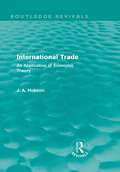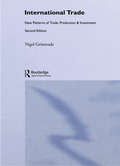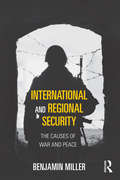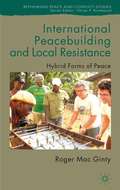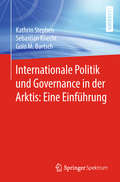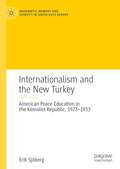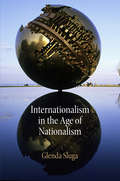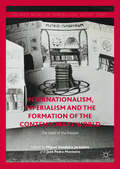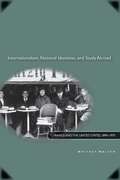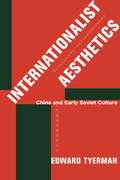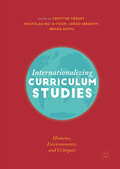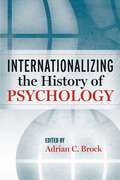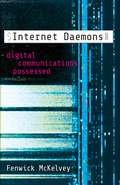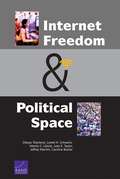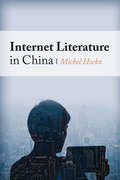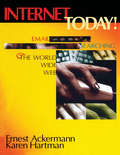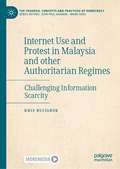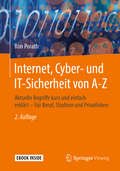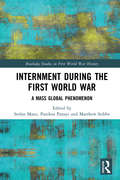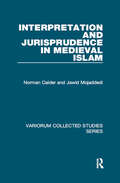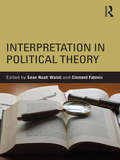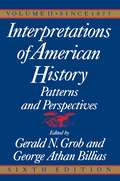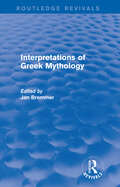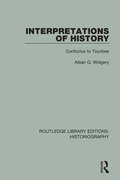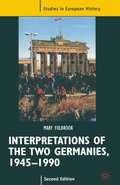- Table View
- List View
International Trade: An Application of Economic Theory (Routledge Revivals)
by J. A. HobsonFirst published in 1904, this important economic work explores some of the leading principles underlining the development of international trade. Hobson offered a departure from the conventional treatment of international trade in economic theory, simplifying concepts of free trade, exchange and tariffs and considering the practical application of theory in a manner accessible to the reader.
International Trade: New Patterns of Trade, Production and Investment
by Nigel GrimwadeThis new edition has been rewritten to provide an up-to-date, clear and comprehensive account of the most important developments currently taking place in the world economy. The text introduces the major economic theories and models with an emphasis on changes within the world trading system and how governments respond. New features include:* an expansion of chapter three to include formal models of intra-industry trade under imperfect competition * two separate chapters on Japan and newly industrialising countries, updating and incorporating new material* new sections on Strategic Trade Policy and on the Political Economy of Protectionism * a new chapter on the institutional aspects of world trade in discussing the deliberations of the World Trade Organisation
International and Regional Security: The Causes of War and Peace (Routledge Global Security Studies)
by Benjamin MillerThis volume is a collection of the best essays of Professor Benjamin Miller on the subjects of international and regional security. The book analyses the interrelationships between international politics and regional and national security, with a special focus on the sources of international conflict and collaboration and the causes of war and peace. More specifically, it explains the sources of intended and unintended great-power conflict and collaboration. The book also accounts for the sources of regional war and peace by developing the concept of the state-to-nation balance. Thus the volume is able to explain the variations in the outcomes of great power interventions and the differences in the level and type of war and peace in different eras and various parts of the world. For example, the book’s model can account for recent outcomes such as the effects of the 2003 American intervention in Iraq, the post-2011 Arab Spring and the conflicts between Russia and Ukraine. The book also provides a model for explaining the changes in American grand strategy with a special focus on accounting for the causes of the invasion of Iraq in 2003. Finally, the book addresses the debate on the future of war and peace in the 21st century. This book will be essential reading for students of international security, regional security, Middle Eastern politics, foreign policy and IR.
International peacebuilding and local resistance
by Roger Mac GintyInternational Peacebuilding and Local Resistance adds to the active debates and critiques of internationally-supported peace interventions. Using the case studies of Afghanistan, Iraq, Bosnia, Lebanon and Northern Ireland, Roger Mac Ginty dissects peace interventions along the themes of security, statebuilding and civil society as well as economic and constitutional reform. He proposes using the concepts of hybridity and hybridization to understand the dynamics in societies undergoing transition. Particular attention is paid to the ability of local communities to resist, subvert and exploit international actors. This book is part of a developing and radical critique of aspects of international peacebuilding. It argues that peace should not be discussed timidly, and that local, traditional or indigenous approaches to peacemaking should not be romanticised.
Internationale Politik und Governance in der Arktis: Eine Einführung
by Golo M. Bartsch Sebastian Knecht Kathrin StephenErstmalig in einem deutschsprachigen Lehrbuch werden Geschichte, Akteure, Institutionen und Prozesse der internationalen Arktispolitik vor dem Hintergrund verschiedener Politikfelder sowie Theorien der internationalen Beziehungen anschaulich und verständlich analysiert. Fragen wie „Was macht die Arktis als Region in den internationalen Beziehungen aus?“, „Welche Akteure und Institutionen spielen eine Rolle in der Arktispolitik?“, „Welche Bedeutung kommt den Ressourcen und Schifffahrtswegen in einer zugänglich werdenden Arktis zu?“ und „Welche umwelt- und sicherheitspolitischen Bedenken gehen mit einer wärmeren Arktis einher?“ stehen im Zentrum aktueller wissenschaftlicher wie politischer Debatten, welchen sich dieses Buch annimmt. Es bietet damit für Einsteiger ebenso wie für fortgeschrittene Arktiskundige eine Orientierung zwischen den Extremen der historischen Romantisierung der Nordpolarregion als Niemandsland und ihrer aktuellen Charakterisierung als drohendem Konfliktraum.Das Buch beleuchtet verschiedene Konzepte und Theorieansätze aus den internationalen Beziehungen, dem internationalen Recht und der politischen Geografie und unterzieht sie einem Eignungstest für die Erklärung arktispolitischer Vorgänge in den Bereichen Ressourcen-, Umwelt- und Sicherheitspolitik. Damit liefert es akademische wie praxisrelevante Orientierung für jeden, der politische Prozesse in der Arktis anhand konkreter theoretischer Annahmen zu verstehen sucht, und gibt Anregungen und Impulse für zukünftige Forschungsarbeit.
Internationalism and the New Turkey: American Peace Education in the Kemalist Republic, 1923-1933 (Modernity, Memory and Identity in South-East Europe)
by Erik SjöbergThis book examines international education in Turkey after World War I. In this period, a movement for peace and international education among American educators emerged. This effort, however, had to be reconciled with the nationalist projects of new nation-states emerging from the war. In the case of the Near East that meant coming to terms with the radically nationalist modernization project of Kemal Atatürk’s Turkish Republic. Using the case of Robert College, an American educational institution in Istanbul, which aimed to foster a future local elite of a multi-ethnic and multi-religious student body, the book sheds light on the negotiation between two conceptions of modernity, as represented by American internationalist ideals and the tenets of Kemalism the Westernizing, yet deeply ethnocentric national ideology of post-1923 Turkey. Based on recently declassified archival sources, this study addresses the educational intentions and strategies for adjustment of college faculty. It also offers a rare insight into the mindset of young students attempting to make sense of what internationalism and religious, ethnic and national identity meant in the Ottoman past and in the new republican Turkey. Focusing on Robert College and the forgotten case of its dean and social studies instructor, Dr. Edgar Jacob Fisher, it addresses the little-researched field of internationalism and peace education in interwar Turkey.
Internationalism in the Age of Nationalism
by Glenda SlugaThe twentieth century, a time of profound disillusionment with nationalism, was also the great age of internationalism. To the twenty-first-century historian, the period from the late nineteenth century until the end of the Cold War is distinctive for its nationalist preoccupations, while internationalism is often construed as the purview of ideologues and idealists, a remnant of Enlightenment-era narratives of the progress of humanity into a global community. Glenda Sluga argues to the contrary, that the concepts of nationalism and internationalism were very much entwined throughout the twentieth century and mutually shaped the attitudes toward interdependence and transnationalism that influence global politics in the present day.Internationalism in the Age of Nationalism traces the arc of internationalism through its rise before World War I, its apogee at the end of World War II, its reprise in the global seventies and the post-Cold War nineties, and its decline after 9/11. Drawing on original archival material and contemporary accounts, Sluga focuses on specific moments when visions of global community occupied the liberal political mainstream, often through the maneuvers of iconic organizations such as the League of Nations and the United Nations, which stood for the sovereignty of nation-states while creating the conditions under which marginalized colonial subjects and women could make their voices heard in an international arena. In this retelling of the history of the twentieth century, conceptions of sovereignty, community, and identity were the objects of trade and reinvention among diverse intellectual and social communities, and internationalism was imagined as the means of national independence and national rights, as well as the antidote to nationalism.This innovative history highlights the role of internationalism in the evolution of political, economic, social, and cultural modernity, and maps out a new way of thinking about the twentieth century.
Internationalism, Imperialism and the Formation of the Contemporary World
by Miguel Bandeira Jerónimo José Pedro MonteiroThis volume offers innovative insights into and approaches to the multiple historical intersections between distinct modalities of internationalism and imperialism during the twentieth century, across a range of contexts. Bringing together scholars from diverse theoretical, methodological and geographical backgrounds, the book explores an array of fundamental actors, institutions and processes that have decisively shaped contemporary history and the present. Among other crucial topics, it considers the expansion in the number and scope of activities of international organizations and its impact on formal and informal imperial polities, as well as the propagation of developmentalist ethos and discourses, relating them to major historical processes such as the growing institutionalization of international scrutiny in the interwar years or, later, the emerging global Cold War.
Internationalism, National Identities, and Study Abroad
by Whitney WaltonThis book--the first long-term study of educational travel between France and the United States--suggests that, by studying abroad, ordinary people are constructively involved in international relations. Author Whitney Walton analyzes study abroad from the perspectives of the students, schools, governments, and NGOs involved and charts its changing purpose and meaning throughout the twentieth century. She shows how students' preconceptions of themselves, their culture, and the other nationality--particularly differences in gender roles--shaped their experiences and were transformed during their time abroad. This book presents Franco-American relations in the twentieth century as a complex mixture of mutual fascination, apprehension, and appreciation--an alternative narrative to the common framework of Americanization and anti-Americanism. It offers a new definition of internationalism as a process of questioning stereotypes, reassessing national identities, and acquiring a tolerance for and appreciation of difference.
Internationalist Aesthetics: China and Early Soviet Culture
by Edward TyermanFollowing the failure of communist revolutions in Europe, in the 1920s the Soviet Union turned its attention to fostering anticolonial uprisings in Asia. China, divided politically between rival military factions and dominated economically by imperial powers, emerged as the Comintern’s prime target. At the same time, a host of prominent figures in Soviet literature, film, and theater traveled to China, met with Chinese students in Moscow, and placed contemporary China on the new Soviet stage. They sought to reimagine the relationship with China in the terms of socialist internationalism—and, in the process, determine how internationalism was supposed to look and feel in practice.Internationalist Aesthetics offers a groundbreaking account of the crucial role that China played in the early Soviet cultural imagination. Edward Tyerman tracks how China became the key site for Soviet debates over how the political project of socialist internationalism should be mediated, represented, and produced. The central figure in this story, the avant-garde writer Sergei Tret’iakov, journeyed to Beijing in the 1920s and experimented with innovative documentary forms in an attempt to foster a new sense of connection between Chinese and Soviet citizens. Reading across genres and media from reportage and biography to ballet and documentary film, Tyerman shows how Soviet culture sought an aesthetics that could foster a sense of internationalist community. He reveals both the aspirations and the limitations of this project, illuminating a crucial chapter in Sino-Russian relations. Grounded in extensive sources in Russian and Chinese, this cultural history bridges Slavic and East Asian studies and offers new insight into the transnational dynamics that shaped socialist aesthetics and politics in both countries.
Internationalizing Curriculum Studies: Histories, Environments, And Critiques
by Bryan Smith Awad Ibrahim Nicholas Ng-A-Fook Cristyne HébertThis book seeks to understand how to internationalize curriculum without imperializing or imposing the old, colonial, and so-called first-world conceptualizations of education, teaching, and learning. The collection draws on the groundbreaking work of Dwayne Huebner in order to invite scholars into conversation with histories of curriculum studies and to posit them within it, opening up new spaces to work in and through curricular issues. This book will appeal to scholars, teachers, and students looking to reconceptualize international curriculum development and theory.
Internationalizing the History of Psychology
by Adrian C. BrockWhile the United States was dominant in the development of psychology for much of the twentieth century, other countries have experienced significant growth in this area since the end of World War II. The percentage of those in the discipline who live and work in the United States has been growing smaller, and it is now impossible to completely understand the field if developments in psychology outside of the United States are ignored.Internationalizing the History of Psychology brings together luminaries in the field from around the world to address the internationalizing of psychology, each raising core issuesconcerning what an international perspective can contributeto the history of psychology and to our understanding of psychology as a whole. For too long, much of what we havetaken to be the history of psychology has actually been thehistory of American psychology. This volume, ideal for student use and for those in the field, illuminates how what we have been missing may change our views of the nature of psychology and its history.Contributors: Ruben Ardila, Geoffrey Blowers, Adrian C. Brock, Kurt Danziger, Aydan Gulerce, John D. Hogan, Naomi Lee, Johann Louw, Fathali M. Moghaddam, Anand C. Paranjpe, Irmingard Staeuble, Cecilia Taiana, and Thomas P. Vaccaro.
Internet Daemons: Digital Communications Possessed (Electronic Mediations)
by Fenwick McKelveyA complete history and theory of internet daemons brings these little-known—but very consequential—programs into the spotlight We&’re used to talking about how tech giants like Google, Facebook, and Amazon rule the internet, but what about daemons? Ubiquitous programs that have colonized the Net&’s infrastructure—as well as the devices we use to access it—daemons are little known. Fenwick McKelvey weaves together history, theory, and policy to give a full account of where daemons come from and how they influence our lives—including their role in hot-button issues like network neutrality.Going back to Victorian times and the popular thought experiment Maxwell&’s Demon, McKelvey charts how daemons evolved from concept to reality, eventually blossoming into the pandaemonium of code-based creatures that today orchestrates our internet. Digging into real-life examples like sluggish connection speeds, Comcast&’s efforts to control peer-to-peer networking, and Pirate Bay&’s attempts to elude daemonic control (and skirt copyright), McKelvey shows how daemons have been central to the internet, greatly influencing everyday users.Internet Daemons asks important questions about how much control is being handed over to these automated, autonomous programs, and the consequences for transparency and oversight.
Internet Freedom & Political Space
by Lowell H. Schwartz Martin C. Libicki Jeffrey Martini Julie E. Taylor Caroline Baxter Olesya TkachevaThe Internet is a new battleground between governments that censor online content and those who advocate freedom for all to browse, post, and share information online. This report examines how Internet freedom may transform state-society relations in nondemocratic regimes, using case studies of China, Egypt, Russia, and Syria, and also draws parallels between Internet freedom and Radio Free Europe programs during the Cold War.
Internet Literature in China
by Michel HockxRanging from the self-consciously avant-garde to the pornographic, web-based writing has introduced innovative forms, themes, and practices into Chinese literature and its aesthetic traditions.
Internet Today!
by Karen Hartman Ernest AckermannInternet Today! is, as the name implies, a survey of the components and facilities of the Internet; it is also a guide to its use, including a discussion of some features of the Internet, followed by exercises designed to create competence in both understanding and implementing the features. Chapters include: Introduction to the Internet and the World Wide Web; Using a Web Browser; The Basics of Electronic Mail and Using Netscape E-mail; Finding Information on the Web; Directories and Searching; Search Strategies for Search Engines; Writing Your Own Web Pages; Telnet, FTP, and Gopher; Legal Issues, Ethical Issues, Privacy and Security.
Internet Use and Protest in Malaysia and other Authoritarian Regimes: Challenging Information Scarcity (The Theories, Concepts and Practices of Democracy)
by Kris RuijgrokThis book investigates the impact of internet use on anti-government protesting under authoritarian rule. By breaking up the causal chain into various steps, it provides a thorough and nuanced understanding of internet’s role in different stages of the mobilization process. It argues that the impact of internet use on anti-governmental protesting differs per step in the ‘mobilization chain’, and also that the effect depends on both the on- and offline repression of the regime, as well as on the type of internet that is available. While staying far away from any technologically deterministic claims about the internet, the book demonstrates that the internet especially plays an important role in the early stages of the mobilization process: By exposing citizens to alternative political information online, internet users are more likely to become sympathetic towards anti-governmental protest movements.
Internet, Cyber- und IT-Sicherheit von A-Z: Aktuelle Begriffe kurz und einfach erklärt – Für Beruf, Studium und Privatleben
by Ron PorathDie wichtigsten Begriffe zu Internet, Cyber-Risiken, IT-Sicherheit und Datenschutz. Kurz, aktuell, prägnant und einfach zu verstehen. Finden Sie hier schnell und ohne lange Texte lesen zu müssen die Bedeutung von aktuellen und in Zukunft wichtig werdenden Begriffen wie Blockchain, GDPR, Quantencomputer, WannaCry, Hacking, Ransomware oder Künstlicher Intelligenz. Dieses Standardwerk ist schnell zur Hand und darf heutzutage auf keinem Schreibtisch fehlen.
Internment during the First World War: A Mass Global Phenomenon (Routledge Studies in First World War History)
by Panikos Panayi Matthew Stibbe Stefan ManzAlthough civilian internment has become associated with the Second World War in popular memory, it has a longer history. The turning point in this history occurred during the First World War when, in the interests of ‘security’ in a situation of total war, the internment of ‘enemy aliens’ became part of state policy for the belligerent states, resulting in the incarceration, displacement and, in more extreme cases, the death by neglect or deliberate killing of hundreds of thousands of people throughout the world. This pioneering book on internment during the First World War brings together international experts to investigate the importance of the conflict for the history of civilian incarceration.
Interpretation and Jurisprudence in Medieval Islam (Variorum Collected Studies)
by Norman Calder Jawid MojaddediAt the time of his death in 1998, at the age of 47, Norman Calder had become the most widely-discussed scholar in his field. This was largely focused on his monograph, Studies in Early Muslim Jurisprudence (Oxford, 1993), which boldly challenged existing theories about the origins of Islamic Law. The present volume of twenty-one of his articles and book chapters represents the full richness and diversity of Calder's oeuvre, from his initial doctoral research on Shii Islam to his later more philosophical writings on Sunni hermeneutics, in addition to his numerous studies on early Islamic history and jurisprudence. Calder's pioneering research, which was based on a sensitive reading of medieval texts fully informed by contemporary critical theory, often challenged the established assumptions of the day. He is known in particular for urging a reassessment of widely-held prejudices which underestimated the degree of creativity in medieval Islamic scholarship. Many of the articles in this volume have already become classics for the fields of Muslim jurisprudence and hermeneutics.
Interpretation in Political Theory
by Clement Fatovic Sean Noah WalshTheorists interested in learning more about any given interpretive approach are often required to navigate a dizzying array of sources, with no clear sense of where to begin. The prose of many primary sources is often steeped in dense and technical argot that novices find intimidating or even impenetrable. Interpretation in Political Theory provide students of political theory a single introductory reference guide to major approaches to interpretation available in the field today. Comprehensive and clearly written, the book includes: A historical and theoretical overview that situates the practice of interpretation within the development of political theory in the twentieth century. Chapters on Straussian esotericism, historical approaches within the Cambridge School of interpretation, materialist approaches associated with Marxism, the critical approaches associated with varieties of feminism, Greimassian semiotics, Foucaultian genealogy, the negative dialectics of Theodor Adorno, deconstruction as exemplified by Jacques Derrida and Paul de Man, and Lacanian psychoanalysis. An exposition of the theoretical and disciplinary background of each approach, the tools and techniques of interpretation it uses, its assumptions about what counts as a relevant text in political theory, and what it considers to be the purpose or objective of reading in political theory. A reading of Thomas Hobbes’s Leviathan to illustrate how each approach can be applied in practice. A list of suggestions for further reading that will guide those interested in pursuing more advanced study. An invaluable textbook for advanced undergraduates, graduate students, and even seasoned scholars of political theory interested in learning more about different interpretive approaches.
Interpretations of American History, 6th Ed, Vol. 2 (Since #1877)
by Gerald N. Grob George Athan BilliasThis collection of essays on American history reflects recent scholarship. Contributors new to this edition include Gary Nash, Arthur Schlesinger, Richard P. McCormick, Gerda Lerner, Ellen C. DuBois, Vicki L. Ruiz, Nathan I. Huggins, John Lewis Gaddis, Paul Kennedy and Kevin P. Philips. Edited by Gerald N. Grob and George Athan Billias.
Interpretations of Greek Mythology (Routledge Revivals)
by Jan N. BremmerInterpretations of Greek Mythology, first published in1987, builds on the innovative work of Walter Burkert and the ‘Paris school’ of Jean-Pierre Vernant, and represents a renewal of interpretation of Greek mythology. The contributors to this volume present a variety of approaches to the Greek myths, all of which eschew a monolithic or exclusively structuralist hermeneutic method. Specifically, the notion that mythology can simply be read as a primitive mode of narrative history is rejected, with emphasis instead being placed on the relationships between mythology and history, ritual and political genealogy. The essays concentrate on some of the best known characters and themes – Oedipus, Orpheus, Narcissus – reflecting the complexity and fascination of the Greek imagination. The volume will long remain an indispensable tool for the study of Greek mythology, and it is of great interest to anyone interested in the development of Greek culture and civilisation and the nature of myth.
Interpretations of History: From Confucius to Toynbee (Routledge Library Editions: Historiography)
by Alban G. WidgeryIn this volume, originally published in 1961, the author presents an exposition of the meanings given to history. Part 1 describes the conceptions of history impied in wide-spread religions and cultures, Confucian and Taoist, Hindu and Buddhist, Zoroastrian and Muslim, Greek and Roman, Jewish and Christian. Part 2 surveys the theories of independent thinkers and schools in the Occident from the Middle Ages to the mid-twentieth century.
Interpretations of the Two Germanies
by Mary FulbrookThe two Germanies, arising from the unpromising ashes of defeated Nazi Germany, came to represent opposing models of state and society. The Federal Republic established itself as a remarkably stable democracy and successful social market economy: the German Democratic Republic developed an apparently exemplary form of 'actually existing socialism' and became a pillar of the Soviet bloc. Then in 1989, the 'gentle revolution' in East Germany added a new twist with the collapse of Communist rule. With rapid reunification, the united Germany of 1990 faced new challenges as the unprecedented transformation created a multitude of economic problems and social tensions. Previously published in 1992 as The Two Germanies, this book has been fully revised and updated to take account of all the latest developments in contemporary German history.
